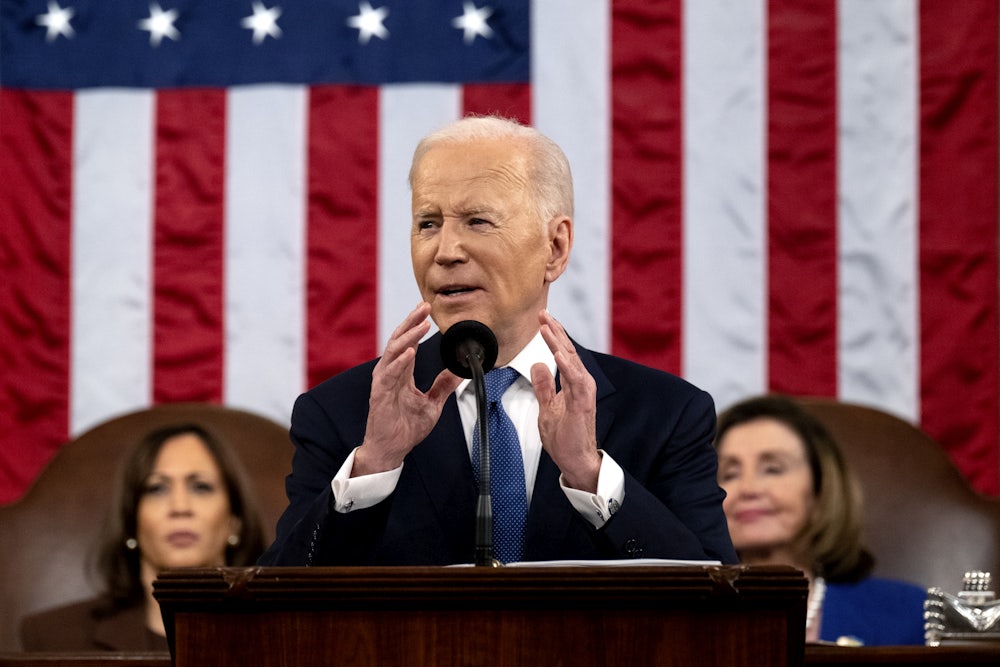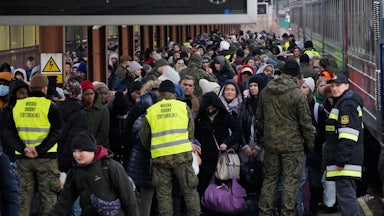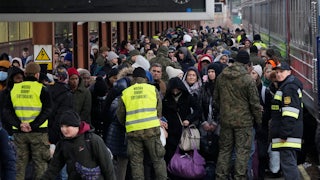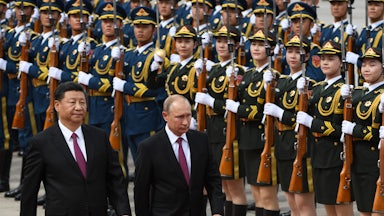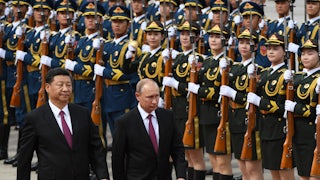In a different world, Joe Biden’s first State of the Union Address might have revolved around economic growth, the historic nomination of Ketanji Brown Jackson to the Supreme Court, and the growing sense that normal life is finally resuming as omicron fades and the CDC lifts most of its mask mandates.
Instead, fate in the form of Vladimir Putin turned Tuesday night’s address to Congress into what should have been the most important foreign policy speech by a president since George W. Bush misguidedly coined the Axis of Evil and then, a little more than a year later, launched the Iraq War from the Oval Office. Instead of Bush’s dangerously expansive view of America’s unlimited power to rearrange the globe, Biden faced the challenge of both asserting American resolve in support of Ukraine and acknowledging the tragic battlefield realities of U.S. powerlessness.
With many members of Congress and invited guests wearing the blue and yellow colors of the Ukrainian flag—and Ukraine’s ambassador to the United States in the building as a special guest—Biden declared that Putin “thought he could roll into Ukraine and the world would roll over. Instead he met a wall of strength he never imagined.”
Biden also asked for a standing ovation to “show that, yes, the United States of America stands with the Ukrainian people.” At a time of bitter domestic division—just one year after a president who basked in Putin’s aura left office—there were no visible refusniks on the floor of the House chamber. For the moment, all of America seemed to stand united with Ukraine and Volodymyr Zelenskiy, its stalwart and unyielding president.
Yet little that Biden said to Congress and the world Tuesday night was new or notably different from his recent afternoon speeches on the most devastating war in Europe in this century. Biden waxed a trifle self-congratulatory when he said, “I spent countless hours unifying our European allies.” And the president won deserved bipartisan cheers when he declared, “The U.S. Department of Justice is assembling a dedicated task force to go after the crimes of Russian oligarchs.”
But with a 40-mile convoy bearing down on Kyiv and civilians dying from Russian missiles all over Ukraine, the president’s boasting about trans-Atlantic unity and the tough sanctions on Russia ran the risk of offering too little too late. Biden forcefully stressed that America and its allies “will defend every inch of territory of NATO countries.” But Ukraine is not in NATO. Only obliquely did Biden acknowledge the brutal battlefield realities as he said, “The Ukrainians are fighting back with pure courage. But the next few days, weeks, months will be hard on them.”
Then in a head-spinning transition, Biden quickly switched into a speech that amounted to a far too normal State of the Union address, the sort of speech you could imagine his staff had already prewritten a month ago. A little more than 10 minutes on Ukraine, and then it was back to politics as usual, as Biden was suddenly expressing empathy for the American “families [who] are living paycheck to paycheck.”
It seemed apparent that Biden’s speechwriters had been reluctant to abandon their cherished State of the Union draft after Putin launched his invasion. Instead, they just seemed to have added Ukraine at the top of the speech without making the address an integrated whole. It was as understandable psychologically as it was rhetorically unfortunate. There was nothing wrong with many of the initiatives that Biden proposed, but they seemed at odds with the gravity of the moment.
There was, for example, a shout-out to Patrick Gelsinger, the CEO of Intel who was brandishing the Ukrainian colors, for pledging to invest up to $100 billion to build a computer chip plant outside Columbus, Ohio. This embrace of corporate America may have initially looked smart to the president’s political advisers, but it came across as something that should have been excised from the speech as the people of Kyiv were spending another frightening night huddled deep underground on subway platforms.
The invasion of Ukraine has been frequently likened to the way that Nazi Germany and, yes, the Soviet Union dismembered Poland in September 1939 to launch World War II. Four months later, on January 3, 1940, Franklin Roosevelt framed almost his entire State of the Union address around the horrifying events in Europe. Early in the speech, FDR ridiculed isolationism as he stressed, “There is a vast difference between keeping out of war and pretending that this war is none of our business.” And toward the end of his well-crafted address, Roosevelt—anticipating Tucker Carlson—denounced “the apologists for foreign aggressors, and equally those selfish and partisan groups at home who wrap themselves in the false mantle of Americanism to promote their own economic, financial, or political advantage.”
While Biden’s address didn’t hold together as a speech (and, in fairness, few State of the Unions do), it did offer a crash course in how Democratic consultants plan to defend the party’s narrow congressional majorities. “Made in America” clearly polls well among swing voters in Midwestern battleground states since Biden pledged to “buy American,” to preside over the “revitalization of American manufacturing,” and to “support American jobs.”
In one of the most overtly political moments in the speech, Biden unequivocally distanced himself from a slogan that has damaged the Democrats in poll after poll. Speaking about crime, the president said, “The answer is not to defund the police. The answer is to FUND the police with the resources and training they need to protect our communities.”
Trying to build a bridge to the Republicans in Congress, Biden appealed to the impossible dream of bipartisan comity by laying out plausible areas of political agreement in what he called “a Unity Agenda.” They ranged from battling the opioid epidemic to providing new funding to search for breakthroughs in the battle against Alzheimer’s, diabetes, and cancer. These are all worthy goals. But rhetorically, it would have made sense to couple these across-the-aisle initiatives with the rare outbursts of national unity as the president discussed Ukraine at the beginning of the speech.
No one realistically expected the State of the Union to dramatically lift Biden’s flagging poll numbers. Any improvement will come gradually, if at all. And there may be elements in Tuesday night’s speech, if repackaged, that could help the Democrats in their uphill struggle in November.
Like most State of the Unions, this one will probably be soon forgotten. If it will be remembered at all, it should be recalled as the missed-opportunities speech. On the anniversary of January 6, 2021, Biden delivered a powerful address about democracy. But two months later, with Ukrainian democracy in peril, Biden barely touched on the topic. And, more important, the president still needs to better explain America’s role in a changing and dangerous world as Ukraine faces the blistering effects of Putin’s nuclear-armed temper tantrum.
